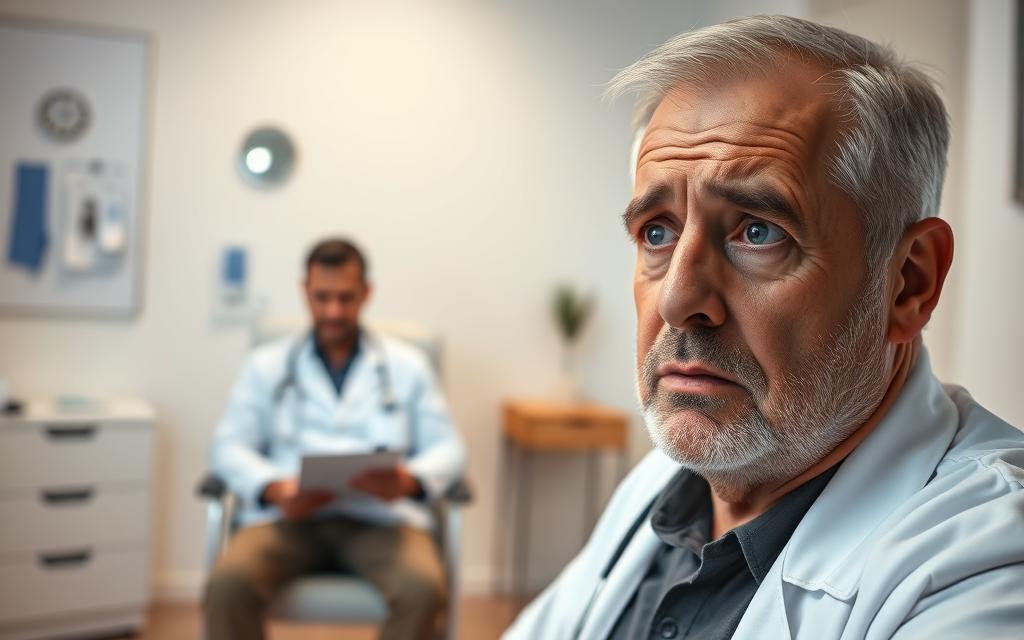Can Vyvanse Cause Erectile Dysfunction? Explore the Effects
Vyvanse, a commonly prescribed medication for Attention Deficit Hyperactivity Disorder (ADHD), has been a subject of interest regarding its potential impact on sexual health. Individuals taking Vyvanse may wonder if it affects their sexual well-being, particularly concerning erectile dysfunction.
This section will delve into the relationship between Vyvanse and its potential side effects on sexual health. We will explore the possible effects of Vyvanse on erectile function and discuss the broader context of ADHD medication side effects.
Understanding the potential link between Vyvanse and erectile dysfunction is crucial for individuals who rely on this medication for managing ADHD symptoms.
Understanding Vyvanse and Its Primary Uses
To understand the potential effects of Vyvanse on erectile function, it’s essential to first grasp what Vyvanse is and its primary uses. Vyvanse is a prescription medication primarily used to treat Attention Deficit Hyperactivity Disorder (ADHD) and Binge Eating Disorder (BED). Its active ingredient, lisdexamfetamine, is a central nervous system stimulant that affects certain chemicals in the brain.
What is Vyvanse and How It Works
Vyvanse works by increasing the levels of certain neurotransmitters in the brain, such as dopamine and norepinephrine, which play crucial roles in attention and impulse control. By enhancing these neurotransmitter levels, Vyvanse helps improve symptoms of ADHD, including inattention, hyperactivity, and impulsivity.
Common Reasons for Vyvanse Prescription
Healthcare providers commonly prescribe Vyvanse for individuals diagnosed with ADHD, particularly when other treatments have been ineffective or have caused undesirable side effects. It’s also prescribed for adults and children, typically aged 6 and above, under strict medical supervision.
General Side Effect Profile
Like any medication, Vyvanse can cause side effects, ranging from mild to severe. Common side effects include insomnia, dry mouth, loss of appetite, and anxiety. Understanding these potential side effects is crucial for patients to be aware of what to expect when taking Vyvanse.
The Physiological Mechanisms Behind Vyvanse and Sexual Function
The physiological effects of Vyvanse on sexual function are complex, involving alterations in stimulant response, cardiovascular health, and neurotransmitter balance. Vyvanse, as a stimulant medication, primarily affects the body’s physiological processes by altering the levels of certain neurotransmitters in the brain.
How Stimulants Affect the Cardiovascular System
Stimulants like Vyvanse can have a significant impact on the cardiovascular system. They can cause an increase in heart rate and blood pressure, which may lead to cardiovascular complications in some individuals. This effect is particularly relevant when considering sexual function, as a healthy cardiovascular system is essential for normal erectile function.
Neurotransmitter Changes and Their Impact on Sexual Response
Vyvanse influences neurotransmitters such as dopamine and norepinephrine, which play crucial roles in regulating sexual response. Changes in the levels of these neurotransmitters can affect libido and erectile function. For instance, an increase in dopamine can enhance sexual desire, but alterations in its balance might lead to sexual dysfunction.
Hormonal Influences of Vyvanse
The hormonal influences of Vyvanse on sexual function are another critical aspect. Vyvanse can affect the balance of various hormones, including testosterone, which is vital for maintaining normal sexual function. The table below summarizes the potential effects of Vyvanse on hormonal balances and sexual function.
| Hormone | Effect of Vyvanse | Impact on Sexual Function |
|---|---|---|
| Testosterone | Potential decrease | Reduced libido, erectile dysfunction |
| Dopamine | Increased levels | Enhanced sexual desire, but potential dysfunction with imbalance |
| Norepinephrine | Increased levels | Affects erectile function and sexual response |
Understanding these physiological mechanisms is crucial for individuals taking Vyvanse and experiencing sexual side effects. By recognizing the potential impacts on the cardiovascular system, neurotransmitters, and hormonal balances, healthcare providers can offer more targeted advice and interventions.
Can Anxiety and Depression Cause Erectile Dysfunction?
Anxiety and depression are mental health conditions that can significantly impact an individual’s sexual health, potentially leading to erectile dysfunction (ED). The relationship between mental health and sexual function is complex, involving various psychological and physiological factors.
The Psychological Pathways to ED
The psychological pathways through which anxiety and depression affect erectile function are multifaceted. Anxiety can lead to performance anxiety, creating a cycle where the fear of not performing well sexually exacerbates the problem. Depression can diminish libido and affect overall sexual satisfaction, further complicating erectile function.
For instance, a person experiencing anxiety may have heightened stress levels, which can negatively impact sexual performance. Similarly, individuals with depression may experience a decrease in sexual desire, making it challenging to achieve or maintain an erection.
Stress Hormones and Their Effect on Sexual Performance
Stress hormones, such as cortisol and adrenaline, play a significant role in the body’s response to anxiety and depression. These hormones can interfere with the normal physiological processes involved in achieving an erection. For example, chronically elevated cortisol levels can disrupt the balance of hormones necessary for sexual function, including testosterone.
Statistical Evidence Linking Mental Health and ED
Research has shown a significant correlation between mental health conditions and erectile dysfunction. Studies have indicated that men with anxiety and depression are more likely to experience ED. According to a study published in the Journal of Sexual Medicine, the prevalence of ED is higher in men with depression compared to those without.
| Mental Health Condition | Prevalence of ED |
|---|---|
| Anxiety | 35% |
| Depression | 42% |
| No Mental Health Condition | 15% |
For more information on how anxiety can affect erectile dysfunction, visit Colorado Urologists. Understanding the link between mental health and sexual function is crucial for developing effective treatment plans that address both the psychological and physiological aspects of erectile dysfunction.
Distinguishing Between Medication-Induced and Psychological ED
Identifying whether erectile dysfunction is caused by medication or psychological factors is essential for determining the appropriate treatment plan. This distinction is particularly relevant for individuals taking medications like Vyvanse, where the side effect profile may include sexual dysfunction.
Timing and Patterns of ED Symptoms
The onset and pattern of erectile dysfunction symptoms can provide valuable clues about their cause. Medication-induced ED often manifests shortly after starting a new medication or changing the dosage. In contrast, psychological ED may develop more gradually, influenced by factors such as stress, anxiety, or relationship issues.

The Role of Underlying Conditions vs. Medication Effects
Underlying health conditions, such as diabetes or cardiovascular disease, can contribute to erectile dysfunction. It’s crucial to differentiate between ED caused by these conditions and ED induced by medication. Healthcare providers consider a patient’s overall health profile when making this distinction.
Diagnostic Approaches for Healthcare Providers
Healthcare providers use a comprehensive diagnostic approach to determine the cause of ED. This may include a thorough medical history, physical examination, and potentially, psychological assessments. By understanding the underlying cause, providers can develop an effective treatment strategy that may involve adjusting medications, addressing underlying health issues, or recommending therapy.
Managing Sexual Side Effects While Taking Vyvanse
Individuals taking Vyvanse may experience sexual side effects, but there are strategies to manage these issues effectively. It’s essential to understand the available options to mitigate any adverse effects on sexual health.
Dosage Adjustments and Timing Strategies
One approach to managing sexual side effects is through dosage adjustments and timing strategies. Consulting with a healthcare provider can help determine the optimal dosage that balances ADHD management with minimizing sexual side effects. Adjusting the timing of when you take Vyvanse may also help, as the peak effects of the medication may coincide with periods of sexual activity.
Medication Holidays: Benefits and Considerations
Medication holidays are another strategy that may be considered. This involves temporarily stopping the medication on weekends or during other periods when ADHD management is not as critical. However, this approach should be discussed with a healthcare provider to weigh the benefits against potential disruptions in ADHD management.
When to Seek Professional Help
If sexual side effects persist or significantly impact quality of life, it’s crucial to seek professional help. A healthcare provider can offer guidance on alternative treatments or complementary approaches that may alleviate these issues.
| Strategy | Description | Potential Benefit |
|---|---|---|
| Dosage Adjustments | Consulting with a healthcare provider to adjust Vyvanse dosage. | Minimizes sexual side effects while maintaining ADHD management. |
| Medication Holidays | Temporarily stopping Vyvanse during certain periods. | May reduce sexual side effects, but requires careful planning. |
| Professional Guidance | Seeking help from a healthcare provider for persistent issues. | Provides access to alternative treatments and complementary approaches. |
Alternative Treatments and Complementary Approaches
Beyond traditional medication, there are various alternative treatments and complementary approaches that can help manage ADHD and related sexual health issues. These alternatives can offer new hope for individuals experiencing side effects like erectile dysfunction while on Vyvanse.
Other ADHD Medications with Different Side Effect Profiles
For some, switching to a different ADHD medication might alleviate erectile dysfunction. Non-stimulant medications like atomoxetine or guanfacine may offer a different side effect profile compared to stimulants like Vyvanse. It’s essential to consult with a healthcare provider to determine the best alternative.
Non-Pharmacological Strategies for ADHD Management
Non-pharmacological strategies can play a significant role in managing ADHD. These include cognitive-behavioral therapy (CBT), lifestyle changes such as regular exercise, a balanced diet, and mindfulness practices. Such approaches can help reduce ADHD symptoms and potentially mitigate sexual side effects.
ED Treatments Compatible with Vyvanse
For those experiencing erectile dysfunction while on Vyvanse, there are ED treatments that can be used in conjunction with ADHD medication. These include phosphodiesterase type 5 inhibitors (PDE5 inhibitors) like sildenafil, as well as other non-pharmacological treatments such as vacuum erection devices or penile implants in severe cases.

Exploring these alternatives requires a consultation with a healthcare provider to tailor the treatment plan to the individual’s needs, ensuring both effective ADHD management and sexual health.
Conclusion
Vyvanse, a commonly prescribed medication for ADHD management, has been linked to erectile dysfunction in some individuals. The relationship between Vyvanse, mental health, and erectile dysfunction is complex, involving physiological and psychological factors.
Managing ADHD with Vyvanse requires a comprehensive approach, considering both the benefits and potential side effects. Being aware of the potential impact on sexual health can help individuals take proactive steps to mitigate these effects.
Healthcare professionals play a crucial role in guiding patients through these complexities, offering alternative treatments and complementary approaches to manage ADHD and related sexual health concerns.
By understanding the interplay between Vyvanse, mental health, and erectile dysfunction, individuals can make informed decisions about their health, fostering a more holistic approach to ADHD management.
